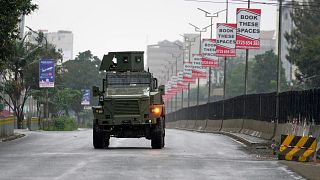Kenya
Kenya's agricultural lands are becoming dried out and barren as weather patterns change.
Drought has left farmers without the crops they have relied on for generations.
For farmer Safari Mbuvi, it's a devastating blow. He sank 50,000 Kenyan shillings in this season alone in planting.
"Since I was young, my father used to get a bounty harvest in this farm, but now, there seems to be a change in climate and the rains are no longer dependable," he says.
"I will not harvest anything, not even a single sack of maize is possible. I have cultivated four or slightly above three acres and the expense I incurred is not recoverable. And I am not the only one. Every farmer in this area has lost everything."
The plants have withered, the maize has turned to dry husks.
"Now I am left wondering, because we are still struggling to farm, the weather is continuously changing, we depend entirely on rainfall, and from the look of things this rain will no longer be reliable, now I don't know what we shall do," says Mbuvi.
Seventy-nine year-old Esther Mulu has seen the weather change over her lifetime.
The widow and mother of seven follows a traditional lifestyle where she stays with her last born son and practices subsistence farming on her one acre of land.
But it seems like this way of life won't survive much longer.
"The world has changed. Because during our youth, we used to harvest millet, sorghum, pumpkins and maize, it used to rain. But now there are no more rains, what is left is hunger, and whenever we wait for the rains, they fail. Now, it is extremely dry and hunger will wipe all of us out," she says.
Some farmers have given up planting crops at all. It's not worth the expense just to see them fail.
Joe Mbalu, who is the Kenya Red Cross head of the Eastern region, says communities need to rethink how they farm.
"The issue of climate change from the experts and from what we have seen as a humanitarian organization, is that it is here with us. That this is going to happen. It is going to continue, maybe even become worse. So for us as communities, as farmers, as pastoralists, then we have to adapt and find out ways that will make us survive more. The old ways of doing things are not going to work. The old seasons that we know are not going to work. So we have to trust in science," he says.
Climate change experts and humanitarian aid organizations are warning that Kenya may sink into the worst drought situation ever.
According to Famine Early Warning System Network (FEWS), more than 4 million people will be in need of sustained humanitarian food assistance in Kenya for the whole of 2022.
He says an average of 200,000 to 300,000 households currently need support.
"But I can assure you that if the situation continues as it is, even as we go back now, as we expect the short rains assessments' results to come out, I am 100 percent sure that my number of beneficiaries, people looking up and needing support will increase because of the situation as it is. Because they are not able to feed themselves. The same farms are not able to produce the same amount of food that they have been able to produce in the past," he warns.
As the situation deteriorates, the little remaining food baskets will run dry and families which have been so resilient will also be exposed to famine.
Households' purchasing power will deteriorate as agricultural labor opportunities remain low, the value of livestock declines and staple food prices will go up, plunging the whole country into a food crisis.
***AP***












11:17
Bridging the legal gap in Africa’s digital boom {Business Africa}
Go to video
First Malaria treatment for babies approved
01:45
Empowering youth in agriculture could boost global economy, FAO report says
02:16
Kenya's William Ruto faces growing discontent over economy and police brutality
01:04
South Africa reports new bird flu outbreak on poultry farms
00:28
Nairobi hawker shot at close range by police declared brain dead